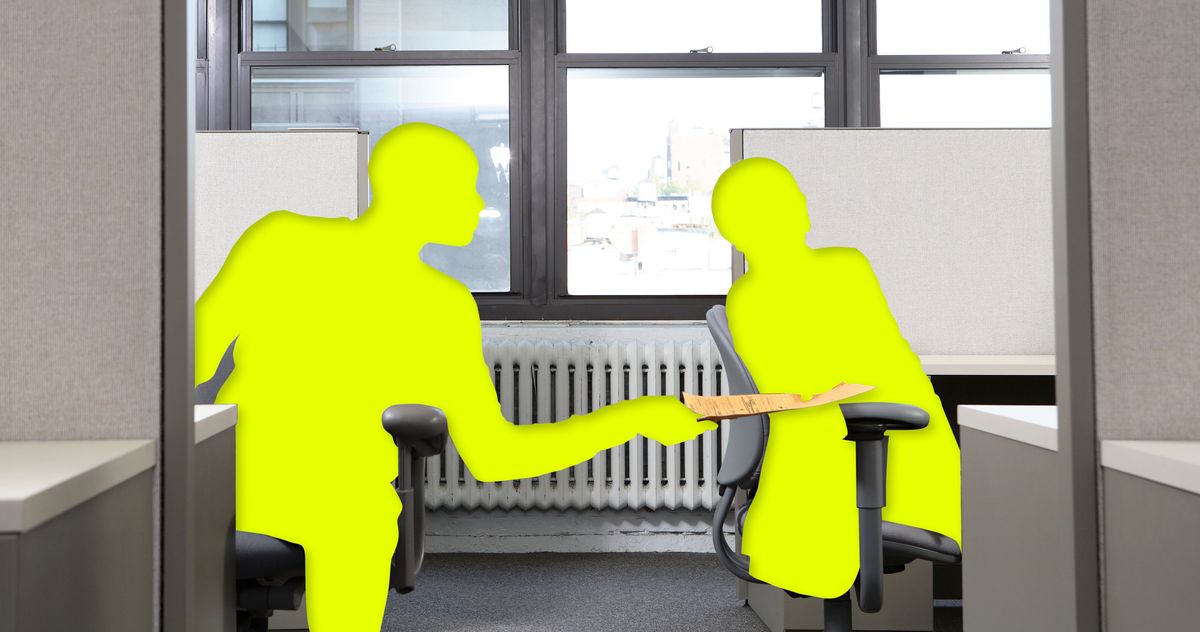[ad_1]
Photo-Illustration: Bordered. Photo: Allison Michael Orenstein / Getty Images
When Mayor Bill de Blasio announced earlier this month that the city’s 300,000 municipal workers were scheduled to return to office five days a week on September 13, many city workers panicked. Parents rushed to line up at daycare. The immunocompromised rushed to file requests to continue working remotely. And people in every department, from junior employees to senior executives, have started updating their resumes. By recalling employees as the Delta variant still overwhelms the country, de Blasio has prepared the city government for a personnel crisis.
Conversations with more than a dozen city employees reveal a workforce bracing for a critical loss of staff across all departments. All but two of the Curbed employees interviewed (who all requested anonymity because they are not permitted to speak in public) said they were actively seeking new positions or were considering leaving the workforce altogether. Although they are passionate about serving the public, working for the city has become a handicap and they are now looking to higher paying jobs in the private sector. Some have already given their two weeks’ notice. Labor shortages threaten to slow down municipal services and block projects over time, and all New Yorkers will suffer the consequences.
“It accelerates a brain drain after 18 months of attrition. We are already a skeletal team, operating on fumes. Morale was already very low, â€said a director of the Department of Housing Preservation and Development. “It’s like a catastrophic spiral that continues to fuel itself because the staff that remain, their jobs get bigger and bigger, bigger and bigger, making it less likely that those staff will be retained.”
The division that oversees the city’s affordable housing projects pipeline recently suffered a “mass exodus,” as one staff member put it. HPD says it is still pursuing new development agreements, but “prioritizes direct staff engagement on our projects ending this year” meaning that new development projects are basically in the pipeline. night light. The housing department said it would not be able to assign additional staff to new construction and preservation projects until more positions were filled, which it currently expects. let it happen next year. But if more employees are leaving now, they are unlikely to be staffed anytime soon, especially since Eric Adams, the Democratic mayoral candidate, has pledged a two-year hiring freeze.
Employees in other highly skilled housing positions are also eyeing the door. “I’m interviewing for jobs where I would earn up to three times my current salary,†said a data analyst at HPD. “I didn’t go into this business for the money, but if I could get a better work-life balance and more pay, it would be really hard to watch that and stay with New York City.”
It may only take a few weeks for someone to resign, but filling those positions could take over a year. Applicants not only need the qualifications to fill these highly skilled positions, they must also meet the requirements of the city’s civil service. And then it takes time for employees to become well versed in their jobs. “I can call on a data scientist, but it takes time for him to understand the context of the information he is interpreting. We have to train these people, â€said an employee of the Department of Town Planning (DCP). “And if they constantly turn around, it’s more of my time spent on professional development and people management, and less of my time on thinking about policy implications and implementation.” of these ideas. It also means that quite simply less work will be done; think of DCP’s NYC Planning Labs team, which creates data transparency tools. “It’s a team that has shrunk and struggled to do as much work as I think it could,†the DCP employee said. “This means that the work we do is less accessible and less transparent. “
At the city’s Human Rights Commission (CCDH), at least two of the agency’s approximately 20 active lawyers resigned the week they were due to return to office. The agency’s lawyers have the critical task of prosecuting anti-discrimination cases, including against landlords refusing housing vouchers and those who racially discriminate against potential tenants. But an existing staff shortage has already led to heavier workloads. Typically, when someone quits, all of their cases are reassigned, but the agency’s lawyers – who could have as many as 50 cases – are already juggling a heavy workload. If more people leave, it will only make it more difficult to process cases efficiently. “I think we’re going to have to turn people away,†said a CCHR lawyer. “And justice delayed is justice denied. “
The city’s dismissal of a housing discrimination case is just one of many quick consequences that mayor’s decree-fueled departures could have on New Yorkers. But de Blasio does not seem concerned: he told the WNYC he was “absolutely convinced” that a full return to the office was the right approach, and implied that the work-from-home era of municipal government has brought about a decreased productivity. . This has frustrated city workers, who say their team’s performance has actually improved while working remotely. Ultimately, they argue, he should just let people continue to work at least partially from home, as many were just a few weeks ago. “The point is that there are a lot of people who work in the city just because they care about the public service, and they could easily find jobs elsewhere,” said Councilor Mark Levine, chairman of the committee. health council that wants the city to introduce a hybrid model of remote work. “And it will be a huge loss for New York.”
[ad_2]

